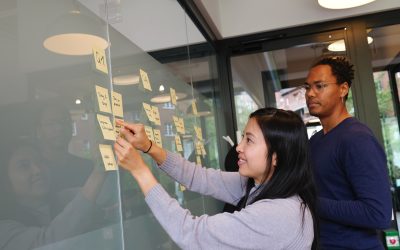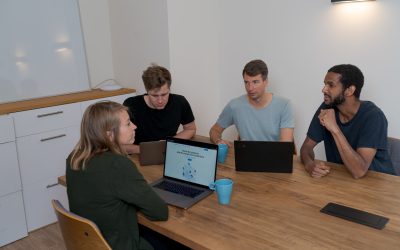Problems and Solutions for Every Stage of the Recruitment Funnel
The recruitment funnel is distinguished into different stages. These stages of the recruitment funnel will give an idea of the recruitment process that guides the candidate to varying levels of closeness to the organisation.
Candidates move from an audience to an employee. The recruitment funnel offers insights into the candidate’s involvement and the organisation’s responsibilities.
The following are the stages of the recruitment funnel:
- Awareness.
- Attraction.
- Application.
- Evaluation.
- Interviewing.
- Hiring.
- Retention.
Every stage comes with its challenges and dealing with such challenges needs an understanding of the impact of every stage of the recruitment funnel. The following are the stages of the recruitment funnel and their solutions that can help you ensure that candidates have a positive experience going through your recruitment funnel.
Awareness
The main factor that encourages the candidate to apply for a job at your company is the brand image you possess. Your organisation’s branding is directly affected by your employer branding and your company culture.
Problems: The main problem with this stage of the recruitment funnel is standing out from your competitors. This is especially difficult when every competitor you face tries to implement their strategy to create awareness with candidates.
Solutions:
- To overcome this problem, you need to have a plan in place to promote your brand that is unique in your way. There might be something that you offer that none of your competitors would possess. Target such areas and encourage them to pull in candidates for your company.
- Let your audience understand your brand story right from the conception of your organisation to the state it is currently in. This will create an awareness of your organisation and help candidates understand more about your story.
- For the story to reach an even wider audience, you need to develop them into compelling content and create a presence on all social media platforms where the candidates are regularly active.
Attraction
The attraction stage is a little similar to the awareness stage, but instead of focusing on the company in general, you focus on the job and the job description to pull in candidates to apply for the role.
Problems: The main problem in the attraction stage of the recruitment funnel is coming up with a creative job description that attracts the ideal candidate.
Solutions:
- When crafting a job description, make sure that the ideal candidate can understand the role and responsibilities of the job without the need for further queries.
- Avoid using needlessly creative titles for the job like Ninja Coder and Rockstar Marketer. Titles such as these will not show up when a candidate searches for a job based on the usual keywords.
- Create job descriptions by putting yourself in the shoes of the candidates. This will help you come up with descriptions that appeal to them.
Application
The application stage of the recruitment funnels deals with the process of the candidate applying for the job they are interested in. This is where the candidate decides to bring themselves into the recruitment funnel.
Problems: The tedious application process can involve many forms to be filled, which can cause the candidate to get tired and lead to a drop off in the application process. If the application completion rate is low, this means that the candidates drop off before completing their application process.
Solutions:
- ATS can parse specific data about the applicant from their resumes. Such data need not be included in the application forms. This will help the candidate apply faster, reducing the application drop-off rate.
- Simplifying the application process to ensure that the candidate has an easier time filling out the necessary details.
- The applicant should have a smooth process when filling the application even when they are on their mobile devices. The application page should support such things.
Evaluation
The evaluation process of the recruitment funnel is where the candidate goes through various assessments and tests given by the company. It is used to determine how much the candidate is qualified to handle the role and responsibilities that come with the job.
Problems: The main problem during the evaluation stage of the recruitment is managing the many applicants that need to be evaluated. Most candidates will not wait a long time for their assessments to be completed. They will become disinterested if the wait time is too long.
Solutions:
- It is best to set up automated emails that can be used to notify the candidate about the changes in their application status. This will make sure that the candidate is informed promptly.
- To handle the bulk application process, use an ATS that can most efficiently help handle all the communication and parsing applications.
- Provide timely updates and inform the candidate in advance if there are any delays. Candidates will appreciate the recruiter’s concern for their time.
Interviewing
Candidates who have cleared the evaluation stage move on to the next stage of the recruitment funnel. The interviewing stage is where candidates meet with the managers and other interviewers in the final evaluation stage.
Problems: The problem with the interviewing stage is that there is a possibility of unconscious bias creeping into the decision-making process. There might be some concerns related to the candidate not performing well due to various reasons. This must also be taken into consideration.
Solutions:
- There can be many interviewers in the interview panel to overcome unconscious bias. Use collaborative hiring to make the interview process as bias-free as possible.
- When forming the hiring team, make sure that a clear structure is followed so that the decision-making process is not sabotaged. This leads to a smooth interview process with the panel.
- Make sure that the interview is not the only factor with which the candidate is extended the job offer.
Hiring
The hiring stage of the recruitment funnel is where the qualified candidate who passed all the evaluations is extended a job offer. The salary negotiation occurs, and the candidate can either reject or accept the job offer.
Problems: The problem with the hiring stage is that the candidate will most likely have multiple job offers. The recruiter must quickly make the job offer and negotiate with the candidate to come to terms with a job offer.
Solutions:
- Start the onboarding process as soon as possible by having a job offer in place if the candidate performs well in the previous stages of the recruitment funnel. This saves time in crafting a new job offer once the results of the interviewing stage are declared.
- Negotiation of the job should smoothly take place, and the candidate should get a clear explanation of all the perks and benefits of the company during this time to encourage them to accept the job offer.
- Ensure that the candidate is engaged right until the first day of the job. The recruiter or the person of contact of the candidate must handle all the needs and queries relating to the job.
Retention
The retention stage comes after the candidate accepts the job offer and becomes an organisation employee. The employee may look for a new job or try for a new role at a different organisation if they feel that they do not have growth where they are. Handling such employees and looking after their growth is the final stage of the recruitment funnel.
Problems: The problem with employee retention is that they might not feel good about their career growth and do not see themselves staying in the same company for a long time. Lack of recognition and good company culture can also lead to employees leaving your company.
Solutions:
- Improving your company’s culture is mandatory for the overall employee experience and gaining a good reputation for the organisation. It also enhances the work-life of the employees.
- Set up a scheme where the employees can upskill and reskill based on the organisation’s requirements. Employees can try to learn new skills that would help them with their career development.
Final Thoughts
Understanding and overcoming the challenges of the recruitment funnel is necessary to ensure that the candidate experience does not take a hit. Each challenge has tailor-made solutions to make the recruitment process more streamlined. Building a good recruitment funnel model for your company can make sure that the members involved in the recruitment have a smooth operation as they go through the recruitment process and improve your employee brand.
LogicMelon
Award-winning recruitment software that will find, attract, hire and analyse the way you want to work. At LogicMelon, we have experienced software recruitment marketing specialists to help you build effective recruitment solutions supported by the best customer service you’ll find anywhere!
Email: sales@logicmelon.com or call LogicMelon (UK) +44 (0) 203 553 3667 (USA) +1 860 269 3089
A Guide to Employee Background Checks
Before welcoming someone into your organisation, remember to request those background checks to ensure they won’t become a liability.
What is Talent Sourcing?
Talent sourcing is the process of identifying candidates and converting them into applicants. Read the blog to know more.
How to Build a Successful Talent Pool
Discover how to create a successful talent pool, the types, and their benefits to achieve long-term objectives in this engaging blog.


